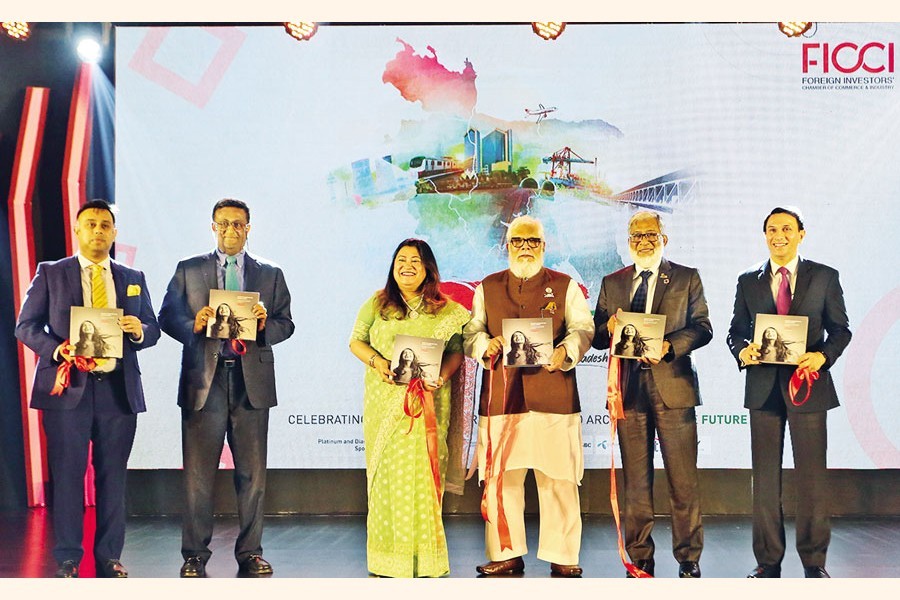Foreign investors in Bangladesh find agribusiness, digital economy and green business as three potential sectors which they think would propel the country onto the next trajectory of development.
While appreciating the country's remarkable socioeconomic progress achieved over the last 50 years, they suggested ensuring pro-business policies to attract FDI (foreign direct investment) in these growth-driving sectors.
They also recommended prioritising high-potential sectors and marketing those globally through proper branding of the country's manufacturing skills.
The businesspeople came up with the suggestions at an event of the Foreign Investors' Chamber of Commerce and Industry (FICCI) in Dhaka on Sunday.
A research report on the three future growth drivers of Bangladesh in accelerating investment opportunities was also released at the event.
The report stresses the importance of policy interventions to benefit more from the sectors where the future of global economy lies.
Policy Exchange Bangladesh (PEB) prepared the report for the FICCI, marking the 50th year of independence of Bangladesh and the birth centenary of Father of the Nation Bangabandhu Sheikh Mujibur Rahman.
Sharing the research findings, PEB founder and chairman Dr. M. Masrur Reaz said the research will help undertake strategic approach by coming out of traditional and general approach that had worked well in past few decades.
"But it will be difficult if we continue the business-as-usual approach in a more competitive and fast-changing world," he told the meet.
About the three growth drivers, he said that around 68 per cent of the global population is expected to live in cities by 2050 when agricultural production needs to be enhanced by 70 per cent due to increase in population.
"We can take the opportunity applying global best practices. Community farming with amalgamation of land could be an option for us as it is successful in Vietnam," he said.
About digital economy, he said technology will dominate the workplace with artificial intelligence and smart assistants being common, while the use of augmented and virtual reality continues to increase by 2050.
While the global green-bond market could be worth over US$ 2.3 trillion by 2023, the climate investment opportunities between now and 2030 would stand at US$ 23 trillion.
Around 24 million new jobs can be created globally by 2030 through shifting to a greener economy, he quoted the International Labour Organization (ILO) as saying.
"So, opportunities are huge in these areas."
Managing Director of Apex Footwear Limited Syed Nasim Manzur said Bangladesh has many fantastic products but these are not sold properly.
Talking about soft power, he said the country needed to learn proper use of the soft power like K-pop of South Korea for branding the country globally.
He also put emphasis on utilising the country's "B power" that he meant for "Baul, Build and Biriyani."
"I think Bangladesh is the factory of the world. We are manufacturing world-class garments, ships, shoes, pharmaceuticals and biriyani. So, this is our time," he said.
Citing an article, he said Bangladesh does not follow traditional path of progress. "We listen to all but follow our own course and we have to find a model that works for Bangladesh. We need to find out something what is best for B-Bangladesh," he added.
MCCI President Barrister Nihad Kabir said the country needed to fix policies about whether it wants FDI or not, whether it wants protection or not.
"The policy needs to be fixed. Once our policies are fixed, we need to act accordingly," she said.
She also highlighted the importance of training the civil servants in the context of private-sector demands in taking the economy further ahead.
Executive Chairman of Bangladesh Investment Development Authority (BIDA) Md. Sirajul Islam said the World Bank has dropped releasing the Ease of Doing Business Index, but it will not hamper their moves to bring reforms to create a feel-good businesses ambiance.
"We will not drop it at all. We will continue improving business climate here through bringing reforms in the regulations on a regular basis," he added.
State Minister for Foreign Affairs Md. Shahriar Alam said they have been discussing with the partners, especially from the European Union, so that the economy is not affected even after graduation from the LDC status.
"We're well aware of the risk factors in the post-graduation regime and we're working on it tirelessly," he added.
Japanese ambassador in Dhaka Ito Naoki laid emphasis on sustainability and predictability of the policies and regulations to woo overseas investors.
South Korean ambassador Lee Jang-keun suggested using success stories of RMG and Nuclear Power Plant for branding the country.
"I believe this roadmap presentation and the three growth drivers will be a good reference in the development planning and will bring in FDI to aid our economy flourish in all sectors," said planning minister M.A Mannan.
He said that these driving sectors will be the key agents of success. "We listen to all and learn from them, but we would like to do things in our way that is our branding."
Prime Minister's private-sector industry and investment affairs adviser Salman F Rahman said each of these sectors has a high potential for meeting the country's economic goals.
The goals are: creating employment for a large number of young and skilled people, increasing export earnings, making significant impact on small and medium enterprises, unlocking potential for long-term sustained growth, and exploring new investment opportunities.
FICCI President Rupali Haque Chowdhury said Bangladesh's GDP growth was negative 5.48 per cent, per-capita income only US$ 134, FDI US$ 90,000 and life expectancy 46.64 years just after the independence.
But the figures now improved to 8.15 per cent, US$ 2,554, US$ 3.61 billion and 72.6 years respectively. "It shows how remarkably we're performing," she added.


